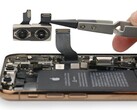GlobalFoundries and TSMC are currently the largest semiconductor manufacturers in the world. Up until the introduction of the 16 nm nodes, both companies were essentially on equal footing, even though TSMC’s fabless client list was looking quite a bit beefier. From the 12 nm nodes onwards, the superiority of TSMC has started to become more apparent, as GlobalFoundries struggled to make the jump to 10 nm and 7 nm. Even AMD, which traditionally relied on GlobalFoundries for the CPU and GPU production, had to strike a deal with TSMC this year in order to launch the highly-anticipated 7 nm Ryzen 3000 and Navi GPUs. Fallen from grace, GlobalFoundries is now invoking a series of patent infringements that allowed TSMC to get ahead in the miniaturization race and also co-opt renowned companies in the process.
The complaints invoked by GlobalFoundries were filed with the US International Trade Commission (ITC), the U.S. Federal District Courts in the Districts of Delaware and the Western District of Texas, and the Regional Courts of Dusseldorf, and Mannheim in Germany. According to GlobalFoundries, TSMC and all of its fabless clients including Apple, Nvidia, Qualcomm, Asus, Broadcom, Cisco, Google, Lenovo and Motorola are liable for infringing on a list of 16 patents covering chip manufacturing techniques, among which the most important are the use of FinFET structures for 28 nm, 16 nm, 12 nm, 10 nm and 7 nm production nodes. If found liable, TSMC may be forced to cough up billions of USD in remedies and the shipments of products integrating TSMC’s chips could get banned from the U.S. and Germany. This means that Apple’s iPhones, Qualcomm’s Snapdragon SoCs and associated handhelds from Google and Motorola, Nvidia’s GPUs, desktops and laptops assembled by Lenovo and Asus, plus networking devices sold by Broadcom and Cisco can also be subject to bans in the U.S. and Germany (possibly even the E.U.).
With the advent of the 7 nm nodes and scheduled jumps to 5 nm in 2021, TSMC is starting to emerge as a monopolistic company. GlobalFoundries, on the other hand, is filing these lawsuits to protect its investments, assets and intellectual property, which will help to ensure that semiconductor manufacturing remains a competitive industry.
I first stepped into the wondrous IT&C world when I was around seven years old. I was instantly fascinated by computerized graphics, whether they were from games or 3D applications like 3D Max. I'm also an avid reader of science fiction, an astrophysics aficionado, and a crypto geek. I started writing PC-related articles for Softpedia and a few blogs back in 2006. I joined the Notebookcheck team in the summer of 2017 and am currently a senior tech writer mostly covering processor, GPU, and laptop news.
> Expert Reviews and News on Laptops, Smartphones and Tech Innovations > News > News Archive > Newsarchive 2019 08 > GlobalFoundries sues TSMC, Apple, Nvidia, Qualcomm and other fabless companies over patent infringements
Bogdan Solca, 2019-08-27 (Update: 2019-08-27)
































